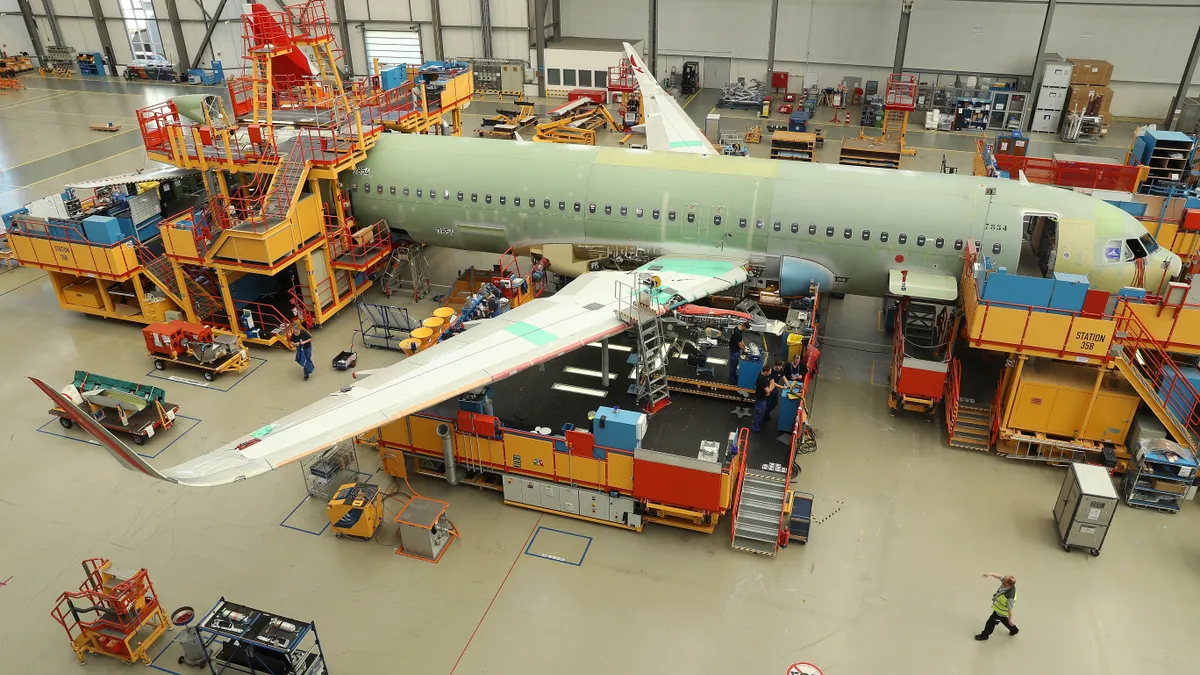Dive Brief:
- Aerospace supplier Pratt & Whitney is recalling and inspecting “a significant portion” of one its engine lines currently in use by aircraft. The recall comes after the company discovered a rare condition in powder metal used to manufacture some parts, according to parent company RTX.
- RTX will pull about 200 of its PW1100G engines by mid-September, with plans to remove and inspect another 1,000 affected engines over the next nine to 12 months, executives told analysts last week.
- The engine supports Airbus’ A320neo family. Airbus CEO Guillaume Faury said in an earings call last week that issue affects parts produced between Q4 2015 and Q3 2021, and not engines currently being produced. “So we do not expect any impact on ongoing deliveries of our plans,” Faury said.
Dive Insight:
The aerospace supply chain has undergone years of turbulence since the onset of the pandemic.
While the PW1100 recall might not hit current manufacturing, it could create a wrinkle for the ecosystem around it. After Airbus executives were asked about this on last week’s call, Faury said that “the pipeline is unchanged and the production flow that comes from Pratt to Airbus for the deliveries is unchanged.”
However, the Airbus chief also noted that “what we need to discuss with [Pratt], sit down, have a better understanding of the challenges and the best allocation of resources at their end” and the potential for “indirect impact linked to the overall allocation of resources at Pratt.”
Having said that, Faury immediately added, “When it comes to the procurement of parts, of equipment, of systems to produce GTF engines for the line fit for Airbus, I don't see reasons why things would change.”
The recall is a result of Pratt’s own monitoring of engine performance over the course of their lifetime through data gathering, parts testing and other efforts. RTX President and COO Christopher Calio told analysts that the engine fleet powering Airbus’ A320 line would be the most affected by the PW1100 recalls.
The operating chief added that capability to perform the the inspections “is already in place and Pratt is developing plans to optimize shop visit capacity within its network to complete these inspections as quickly and efficiently as possible.”
The recall is the third quality issue the company is dealing with at the moment, according to a Vertical Research Partners analyst, who asked executives if they were “concerned about the potential impact on Pratt’s reputation for reliability?”
“If you step back, this is not a GTF design issue, this is a manufacturing process issue on our part with metal,” Calio said in response. “We very quickly went and enhanced those processes to make sure this doesn’t happen again and put in place the enhanced inspection techniques to make sure that we can continue to find this and address them promptly.”
Supply issues have created headaches through the aerospace industry as well. Shortages and supply chain instability at parts supplier Spirit AeroSystems led to issues for multiple downstream manufacturers, including Boeing and Airbus. General Dynamics also reported missed deliveries this year, partly due to late shipments from supplier Honeywell. And disruptions to supply helped send aerospace supplier Incora to bankruptcy in June.














